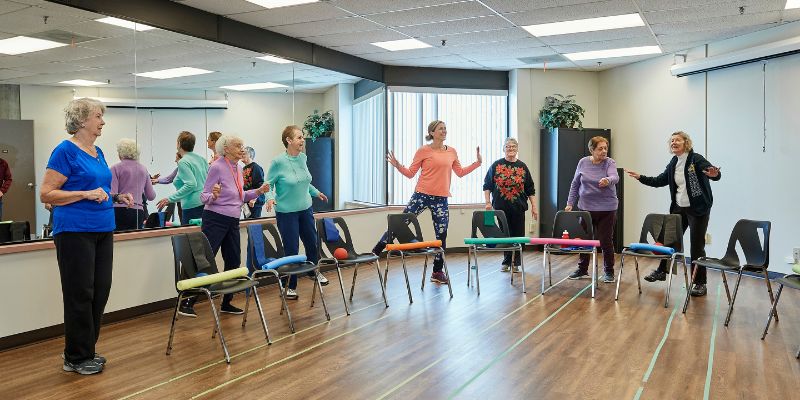Aging gracefully is an art. It’s an intricate ballet where the elements of diet, exercise, and lifestyle converge to create a symphony of longevity, health, and wellness. As we age, the importance of these elements escalates, directly impacting our vitality and overall quality of life. The concept of healthy aging extends far beyond the pursuit of longevity; it centers on living an active, satisfying, and disease-free life for as long as possible.
Our nutritional needs, physical abilities, and lifestyle habits undergo changes as we progress in years. Hence, it’s imperative to adapt and adjust these elements to align with our evolving needs. A balanced diet furnishes our bodies with necessary nutrients, regular exercise maintains mobility and cardiovascular health, while a healthy lifestyle promotes overall well-being.
Here, we delve into 12 strategies for Healthy Aging that encapsulate these elements, each serving as a valuable pillar for healthy aging. These strategies, when practiced consistently, offer a roadmap to improved physical, mental, and emotional health, making your golden years truly golden.
1. Physical Activity Regularity

Regular physical activity is essential strategy for healthy aging. It not only boosts your physical strength and stamina, but also contributes to mental health by reducing anxiety and depression symptoms. Engaging in moderate exercise like walking, swimming, or yoga for at least 150 minutes per week can significantly improve cardiovascular health, maintain healthy body weight, and increase flexibility and balance. This lowers the risk of chronic diseases like heart disease, diabetes, and osteoporosis. Physical activity also enhances cognitive function and delays the onset of cognitive decline. Remember, it’s never too late to start, and the key is to find an activity you enjoy, making it easier to incorporate into your routine.
2. Balanced Nutrition
Adopting a balanced nutritional diet is vital tip for healthy aging. The food we consume acts as fuel for our bodies, directly impacting our physical health and cognitive function. Focus on incorporating a variety of nutrient-dense foods, including fruits, vegetables, lean proteins, healthy fats, and whole grains. These provide essential vitamins, minerals, and fiber, promoting good heart health and improving digestion. Limiting processed food and added sugars can significantly reduce the risk of chronic diseases like diabetes and heart disease. Additionally, staying well-hydrated supports overall body functions and skin health. Remember, good nutrition is a lifelong commitment, not a temporary fix, and every meal is an opportunity to nourish your body.
3. Emotional Health Focus
Maintaining emotional health is as crucial as physical health when aiming for healthy aging. This involves acknowledging and managing feelings, coping with stress in a positive way, maintaining a positive outlook, and cultivating strong relationships. Practice mindfulness and activities that bring joy and relaxation to manage stress effectively. Engage in social activities and maintain strong relationships as they can offer emotional support and improve mental health. Don’t hesitate to seek professional help if you’re dealing with feelings of anxiety, depression, or other mental health concerns. Emotional well-being enhances your ability to enjoy life, handle stress, and develop a well-rounded and meaningful sense of self.
4. Routine Health Screenings
Regular health screenings are vital strategy for healthy aging. These preventative measures can help identify potential health issues before they become serious. Screenings like blood pressure checks, cholesterol level tests, cancer screenings, bone density scans, and eye and hearing exams, are key to early detection and successful treatment. Remember to keep up-to-date with vaccinations and regular dental check-ups too. Consulting with your healthcare provider about the appropriate screenings based on your age, gender, and family history is advisable. Ultimately, proactive health monitoring is one of the best strategies to maintain optimal health as you age.
5. Social Engagement
Maintaining a vibrant social life is a crucial strategy for healthy aging. Social engagement keeps us mentally, emotionally, and even physically active. It strengthens our sense of belonging, reduces feelings of loneliness, and boosts overall happiness. Participate in group activities like community service, clubs, or classes that interest you. Keep close relationships with family and friends, and make an effort to regularly meet new people. Digital communication platforms can also be a valuable tool to stay connected, particularly with distant loved ones. Ultimately, fostering social connections enhances our mental well-being and contributes to our longevity.
6. Stress Management Techniques

Effective stress management is a cornerstone of healthy aging. Chronic stress can lead to physical and mental health issues, such as heart disease, high blood pressure, anxiety, and depression. Incorporate mindfulness techniques like meditation, deep breathing, or yoga into your daily routine. Develop hobbies that bring joy and relaxation, such as gardening, painting, or reading. Engage in regular physical activity, which can serve as a natural stress reliever. Lastly, don’t hesitate to seek professional help if stress becomes overwhelming. Adopting these stress management strategies can greatly enhance your resilience and overall well-being as you age.
Related: 10 Types of Meditation: Which One is Right for You?
7. Quality Sleep Importance
Quality sleep is a key pillar tip of healthy aging. As we age, our sleep patterns can change, but the need for good rest remains constant. Insufficient sleep can lead to cognitive decline, mood swings, and increased susceptibility to illnesses. Establish a regular sleep schedule, create a peaceful sleep environment, and avoid stimulating activities and substances like caffeine or screens before bed. Techniques such as mindfulness, relaxation exercises, or a warm bath can assist in preparing your body for sleep. If you have persistent sleep issues, consult with a healthcare provider to address potential underlying conditions and improve your sleep quality.
8. Hydration Regularity
Maintaining regular hydration is crucial tip for healthy aging. Water plays a fundamental role in regulating body temperature, maintaining cognitive function, facilitating digestion, and keeping skin healthy. As we age, our sense of thirst can diminish, making it essential to consciously consume adequate fluids throughout the day. Aim for 6-8 glasses of water daily, but remember needs may vary based on activity level, climate, and health status. Incorporate hydrating foods like fruits and vegetables, and consider alternatives like herbal teas or broths. Avoid excessive caffeine and alcohol, which can lead to dehydration. Remember, staying hydrated supports overall health and longevity.
9. Healthy Weight Maintenance
Maintaining a healthy weight is a key component of aging healthily. As metabolism slows with age, it becomes essential to balance calorie intake with physical activity to prevent weight gain. Obesity can lead to numerous health issues such as heart disease, diabetes, and certain cancers. To manage weight effectively, focus on nutrient-dense foods like fruits, vegetables, lean proteins, and whole grains, while limiting processed foods high in sugars and unhealthy fats. Regular physical activity, including strength training, can help preserve muscle mass and boost metabolism. Remember, achieving a healthy weight isn’t about rapid, drastic changes, but adopting sustainable, balanced lifestyle habits.
10. Skin Protection

Protecting your skin is an essential strategy of healthy aging. As we age, our skin becomes more vulnerable to sun damage, dryness, and various dermatological conditions. Thus, adopting a regular skincare routine that includes a broad-spectrum sunscreen with SPF 30 or higher, moisturizing daily, and staying hydrated is crucial. Regular check-ups with a dermatologist can help in the early detection and treatment of any skin abnormalities. Additionally, limiting exposure to harsh environmental factors and quitting harmful habits like smoking can also significantly improve the health and appearance of your skin. Remember, healthy skin is not just about aesthetics, it’s a key component of your overall well-being.
Related: The Best Anti-Aging Skincare Ingredients.
11. Mental Stimulation
Maintaining mental stimulation is a significant strategy of healthy aging. As we age, it’s essential to keep our minds active and engaged to foster cognitive health and delay cognitive decline. Engaging in activities that challenge the brain like reading, puzzles, or learning a new skill or language can contribute to mental fitness. Furthermore, staying socially active and maintaining a strong social network can provide mental stimulation and emotional support. Remember, brain health is integral to overall health and well-being. Therefore, just as we exercise our bodies to stay physically fit, we should also engage in activities that stimulate our minds for optimal cognitive fitness.
12. Preventive Care Practices

Practicing preventive care is an essential strategy for healthy aging. It refers to taking steps to prevent diseases before they occur. Regular screenings, immunizations, and maintaining a relationship with your healthcare provider can aid in early disease detection and management. Regular check-ups can monitor blood pressure, cholesterol levels, blood glucose, and many more. Vaccinations are crucial to prevent diseases like the flu, pneumonia, or shingles. Dental, vision, and hearing check-ups are equally important. It’s also essential to discuss any changes in your health or daily routine with your doctor. By focusing on prevention, you can ensure a healthier, longer life.
Conclusion
Adopting these 12 strategies for healthy aging can have a profound impact on your overall health, vitality, and quality of life as you age. By being proactive in your health – from maintaining regular physical activity and a balanced diet to prioritizing emotional well-being and preventive care – you can better navigate the aging process. These strategies are not just about increasing lifespan, but also about enhancing ‘healthspan’, or the years of healthy, active life. Remember, it’s never too late to start, and every little change can make a significant difference. Start today for a healthier tomorrow.


